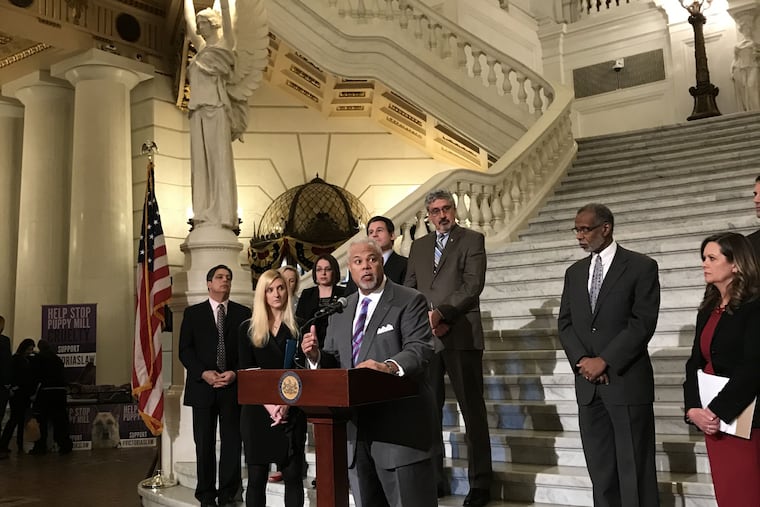Wait, Harrisburg’s trying to get stuff done? | John Baer
A busy week at the state Capitol suggests at least a possibility of change in the legislature.

Maybe it’s the unpleasant (OK, fetid) atmosphere created by a government shutdown, too much partisanship, and a long-playing record of little, if anything, getting done.
Maybe elected officials, even in Pennsylvania, finally are sick of being labeled loathsome, listless, nonstarters.
Whatever it is, there’s suddenly evidence in Harrisburg of bipartisan efforts that could, if successful, begin to alter the state’s image, the land of low expectations.
Look at just this week.
Republican and Democratic senators joined to urge commonsense probation reforms and voting reforms. And Republican and Democratic House members joined to call for reforming House rules to make the legislative process less polarized, more collaborative.
On Monday, Sens. Anthony Williams (D., Phila.) and Camera Bartolotta (R., Washington), at a Capitol news conference with other lawmakers and advocates, pushed a bill they just introduced to reform probation policy.
Their bill (SB 14) is aimed at helping those on probation who have served prison terms for past crimes get back into society quicker. It would, among other things, cap the length of supervision, allow judges to end probation early for good behavior, and minimize risks of ex-cons being subject to probation extensions, even additional jail time, for technical violations such as minor traffic offenses.
Bartolotta said Pennsylvania should join 30 other states in capping probation sentences. Williams said the issue isn’t conservative, liberal, Republican or Democrat, and “is not an abdication of justice.” He said the bill would allow quicker full reentry into society and help reduce over-incarceration.
Philadelphia Democratic Sens. Art Haywood, Sharif Street, and Vincent Hughes are cosponsors.
The measure is supported by groups as diverse as the conservative Commonwealth Foundation and the ACLU.
On Tuesday, another bipartisan effort popped up: a package of election-reform bills aimed at making voting easier.
This comes from Sens. Mike Folmer (R., Lebanon) and Judy Schwank (D., Berks) and includes allowing no-excuse absentee voting, as is done in most states, expanded deadlines for absentee voting (a needed change addressed by my colleague Jonathan Lai’s recent report on thousands of rejected ballots due to too-tight deadlines), and allowing counties to create “curbside voting” at polling places to better assist those with disabilities.
Also, on Tuesday, a bipartisan group of eight House members laid out a series of resolutions to streamline and possibly depolarize House business by making it harder for overly partisan committee chairmen to kill bills in their committees.
Democratic Rep. Pam DeLissio, who represents parts of Philadelphia and Montgomery County, for example, wants to ensure any bill with 20 cosponsors from each party gets a committee vote. And GOP Rep. Gene DiGirolamo, of Bucks County, proposes a study of House rules with recommendations for changes.
All this comes on the heels of Philadelphia Democrats this month introducing an aggressive, sweeping agenda to attack poverty: 23 specific proposals ranging from expanded workforce development programs to additional aid for small businesses and neighborhoods.
And when I ask newly minted House GOP Leader Bryan Cutler about receptivity to rules changes and Philly-backed antipoverty efforts, he says he’s “open” to reviewing the former and finds, in the latter, “half a-dozen” proposals he could support.
We’ll see.
But you and I know our legislature isn’t usually, or ever, into change and/or bipartisanship. This could be a feint to make it seem that normally snoozing Harrisburg is opening its eyes to possibility.
Same for signs the legislature might be starting to understand #MeToo.
(House GOP leadership called for the resignation of its most recently accused member, Rep. Brian Ellis, of Butler County; Senate Democrats say, albeit late, they’re investigating accusations against Montgomery County Sen. Daylin Leach.)
Yes. there are big issues left over from last session, such as redistricting reform and changing statutes of limitations to help victims of child sex abuse, that appear to be sitting idle – two issues surely on the list of Gridlock’s Greatest Hits.
So, I’m not saying things in your Capitol suddenly are better. All I’m saying is suddenly there’s evidence they might be moving in a better direction.